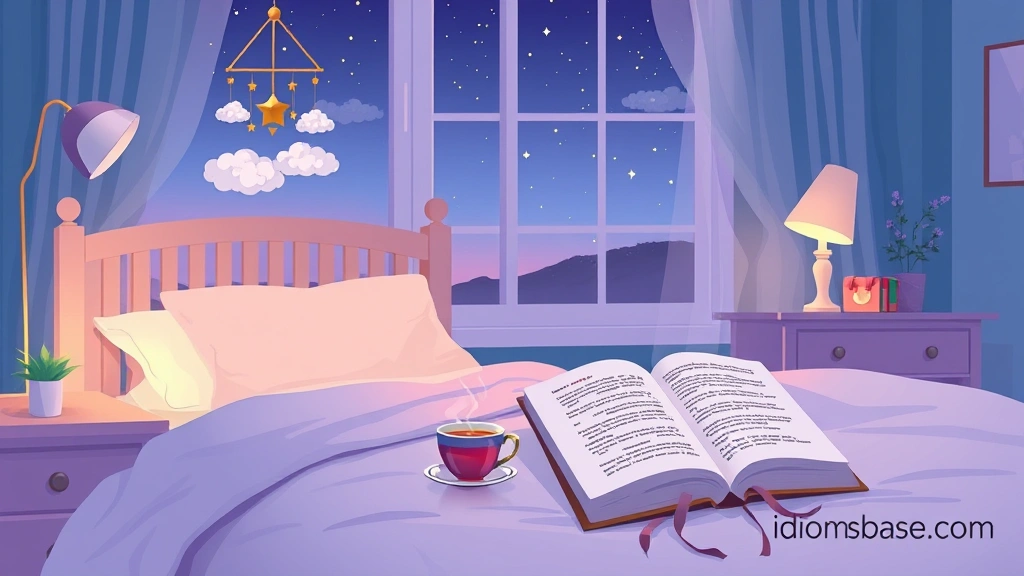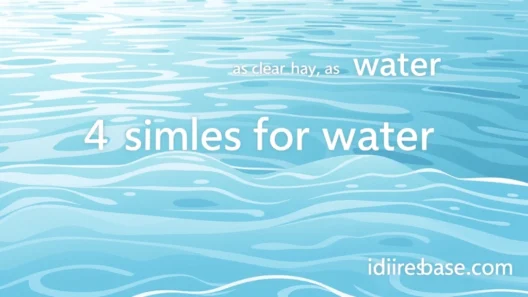Oh, the sweet embrace of sleep! It's that magical time when our bodies recharge, our minds unwind, and the world outside fades into a peaceful blur. But how do we truly describe that profound sense of rest, that deep slumber that washes over us after a long day? Sometimes, words just aren't enough, are they? That's where similes come in!
Similes are like little word-pictures, helping us compare one thing to another using "like" or "as." They make our language more vivid, more relatable, and frankly, a lot more fun! And when it comes to sleep, there's a whole universe of comparisons waiting to be explored. Let's dive into 40 wonderful similes for sleep that will help you describe that ultimate state of rest, whether you're talking about a quick nap or a truly epic snooze!
Drifting Off: Similes for Falling Asleep
Have you ever felt that gentle tug, that slow descent into dreamland? It's a unique sensation, and these similes capture that feeling perfectly.
- As if sinking into a cloud: Imagine the softest, fluffiest cloud cradling you. Pure bliss!
- Like a switch being flipped: One moment you're awake, the next, lights out!
- As if melting into the mattress: Your body relaxes completely, becoming one with the bed.
- Like a boat drifting out to sea: Slowly, gently, you float away from the shore of wakefulness.
- As if the world faded to black: A serene end to the day's hustle.
- Like a warm wave washing over you: A comforting, soothing sensation.
- As if your eyelids were weighted with lead: Too heavy to keep open any longer.
- Like a gentle current pulling you under: An irresistible force drawing you into slumber.
- As if falling through a feather-filled sky: A soft, weightless descent.
- Like a candle flickering out: Slowly, softly, until darkness prevails.
Deep Sleep: Similes for Profound Rest
Once you're truly in the land of nod, it's a deep, undisturbed state. These similes perfectly describe that profound, restorative sleep.
- As sound as a log: A classic for a reason! Logs don't move, and neither do you.
- Like a baby in a cradle: Peaceful, innocent, and completely at ease.
- As still as a statue: No tossing, no turning, just pure stillness.
- Like a stone at the bottom of a well: Deep, unmoving, and undisturbed.
- As heavy as lead: You feel utterly grounded and immobile.
- Like a hibernating bear: Completely lost to the world, storing up energy.
- As quiet as a mouse: Not a peep, not a rustle.
- Like a dead man (or woman): A bit dramatic, but it conveys absolute unconsciousness!
- As peaceful as a sleeping child: Serene and utterly content.
- Like a dreamless void: No thoughts, no worries, just pure nothingness.
Waking Up: Similes for Emerging from Slumber
Even waking up can have its own unique feel, from groggy to refreshed.
- Like a flower opening to the sun: Slowly unfurling, ready for the day.
- As if a fog lifted: Your mind clears, and clarity returns.
- Like a computer rebooting: A fresh start, ready to go.
- As if a light switched on: Suddenly awake and aware.
- Like a bear emerging from its den: A bit groggy, but ready to face the world.

Other Creative Similes for Sleep
Sometimes, sleep is just… sleep. But we can still find creative ways to describe it!
- As refreshing as a cool drink on a hot day: Rejuvenating and satisfying.
- Like a reset button: Wiping the slate clean for a new day.
- As necessary as breathing: You simply can't function without it.
- Like a warm blanket on a cold night: Comforting and protective.
- As vital as water: Essential for life and well-being.
- Like a mini-vacation: A much-needed escape from reality.
- As healing as medicine: It truly mends your body and mind.
- Like a soft whisper of peace: Gentle and calming.
- As comforting as a mother's lullaby: Soothing and reassuring.
- Like a quiet retreat for your mind: A sanctuary from daily stress.
- As restorative as a fresh spring rain: Washing away the old, bringing in the new.
- Like a gentle escape from the day's demands: A welcome break from obligations.
- As precious as gold: A truly valuable commodity.
- Like a deep, silent pond: Calm, still, and reflective.
- As natural as breathing in and out: An inherent part of life's rhythm.
Isn't it fascinating how many ways we can describe something as universal as sleep? Each simile paints a slightly different picture, evoking a unique feeling.
Why Do We Use Similes for Sleep?
You might be wondering, why bother with all these comparisons? Well, similes do a few wonderful things:

- They make descriptions vivid: Instead of just saying "I slept well," you can say "I slept like a baby," and instantly, your listener gets a much clearer picture of the peacefulness.
- They connect with emotions: Similes can tap into our shared experiences and feelings. "As comforting as a warm blanket" evokes a sense of security we all understand.
- They add flair and creativity: Using similes makes your language more engaging and memorable. It shows you're thinking creatively!
- They simplify complex ideas: Sometimes, a complex feeling or state can be best understood by comparing it to something simpler and more familiar.
Key Takeaways
- Similes use "like" or "as" to compare two different things, making descriptions more vivid.
- There are many ways to describe sleep, from falling asleep to deep slumber and waking up.
- Similes enhance language by adding creativity, emotional connection, and clarity.
- Whether you're describing a quick nap or a long night's rest, a simile can help you paint the perfect picture.
Frequently Asked Questions About Similes and Sleep
Q1: What is the most common simile for sleep?
A1: Without a doubt, "as sound as a log" and "sleeping like a baby" are two of the most widely used and recognized similes for deep, peaceful sleep. They've been around for ages and everyone understands what they mean!

Q2: Can I create my own similes for sleep?
A2: Absolutely! The beauty of language is its flexibility. Think about how sleep feels to you – is it like sinking into warm sand? Like a long, quiet hum? Like a gentle hand closing your eyes? The more personal and imaginative, the better!
Q3: How do similes differ from metaphors?
A3: This is a great question! The key difference lies in the use of "like" or "as."
- Similes compare two things using "like" or "as" (e.g., "He slept like a log").
- Metaphors state that one thing is another, without using "like" or "as" (e.g., "Sleep is a gentle escape"). Metaphors are a bit more direct and often imply a deeper identity.
Q4: Why is describing sleep important?
A4: Describing sleep effectively allows us to communicate our physical and emotional state more precisely. If you say you "slept like a baby," it conveys a sense of feeling refreshed and well-rested, which is far more informative than just "I slept." It also helps us appreciate the importance of good sleep in our lives!
Q5: Are there any similes that describe a bad night's sleep?
A5: Yes, there certainly are! While this article focuses on good sleep, you can use similes to describe restless nights too. For example:
- "My sleep was as broken as shattered glass."
- "I tossed and turned like a fish out of water."
- "My mind was as busy as a beehive all night."
These help convey the discomfort and lack of rest.
We hope this journey through the world of sleep similes has been as refreshing as a good night's rest! Language is a powerful tool, and using similes can truly elevate your descriptions, making them more engaging and memorable. So, next time you're talking about hitting the hay, why not try one of these delightful comparisons? Sweet dreams!





